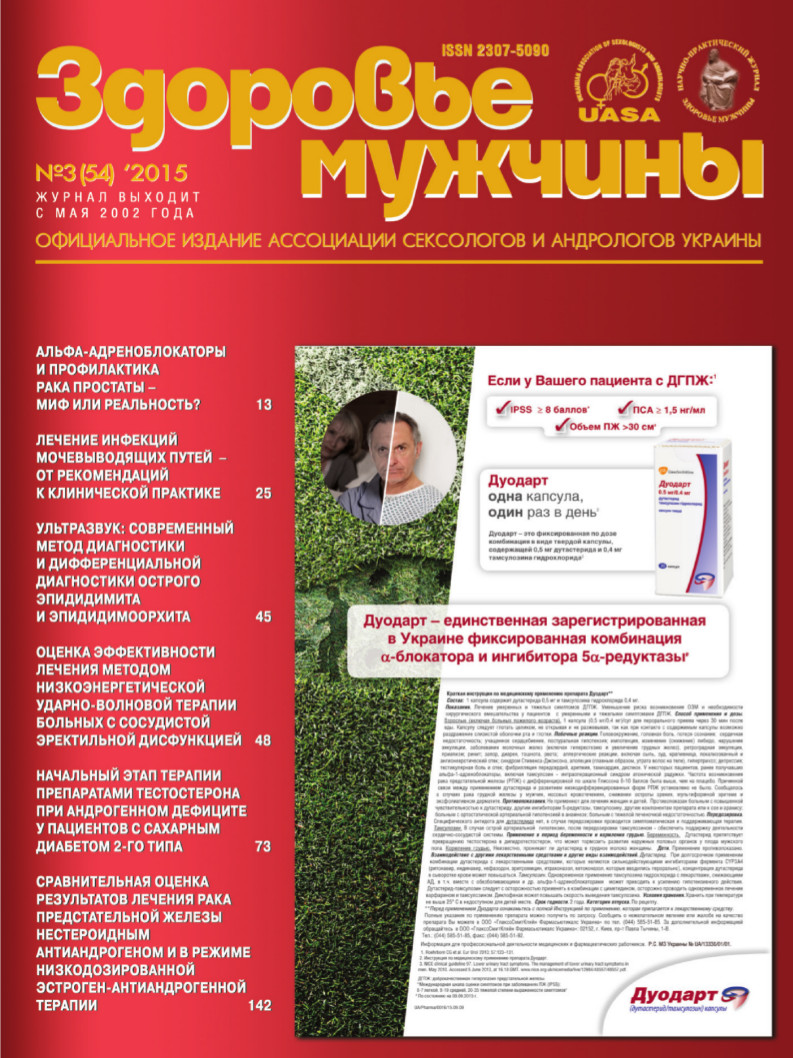Alpha-blockers and prevention of prostate cancer – myth or reality?
##plugins.themes.bootstrap3.article.main##
Abstract
##plugins.themes.bootstrap3.article.details##

This work is licensed under a Creative Commons Attribution 4.0 International License.
Authors retain the copyright and grant the journal the first publication of original scientific articles under the Creative Commons Attribution 4.0 International License, which allows others to distribute work with acknowledgment of authorship and first publication in this journal.
References
Kyprianou N, Jacobs SC. Induction of apoptosis in the prostate by alpha1-adrenoceptor antagonists: a novel effect of «old» drugs// Curr Urol Rep. – 2000. – Aug, 1 (2). – Р. 89–96.
Keledjian K, Borkowski A, Kim G. et al. Reduction of human prostate tumor vascularity by the alpha1-adrenoceptor antagonist terazosin // Prostate. – 2001. – Jul 1; 48 (2). – Р. 71–78.
Kyprianou N. Doxazosin and terazosin suppress prostate growth by inducing apoptosis: clinical significance // J Urol. – 2003. – Apr,169 (4). – Р. 1520–1525.
Saníger MA, Ramírez-Expósito MJ, de la Chica S. et al. Alpha-1-adrenergic receptor blockade modifies insulin-regulated aminopeptidase (IRAP) activity in rat prostate and modulates oxytocin functions// Drug Metab Lett. – 2011. – Aug, 5 (3). – Р. 192–196.
Liao CH, Guh JH, Chueh SC, Yu HJ. Anti-angiogenic effects and mechanism of prazosin // Prostate. – 2011. – Jun 15, 71 (9). – Р. 976–84.
Hori Y, Ishii K, Kanda H. et al. Naftopidil, a selective {alpha}1-adrenoceptor antagonist, suppresses human prostate tumor growth by altering interactions between tumor cells and stroma // Cancer Prev Res (Phila). – 2011. – Jan, 4 (1). – Р. 87–96.
Yamada D, Nishimatsu H, Kumano S. Reduction of prostate cancer incidence by naftopidil, an α1-adrenoceptor antagonist and transforming growth factor-β signaling inhibitor// Int J Urol. – 2013. – Dec, 20 (12). – Р. 1220–1227.
Kyprianou N, Vaughan TB, Michel MC. Apoptosis induction by doxazosin and other quinazoline alpha1-adrenoceptor antagonists: a new mechanism for cancer treatment? // Naunyn Schmiedebergs Arch Pharmacol. – 2009. – Dec, 380 (6). – Р. 473–477.
Ørsted DD, Bojesen SE, Nielsen SF, Nordestgaard BG. Association of clinical benign prostate hyperplasia with prostate cancer incidence and mortality revisited: a nation-wide cohort study of 3,009,258 men // Eur Urol. – 2011. – Oct, 60 (4). – Р. 691–698.
Fryczkowski M, Bryniarski P, Szczкbara M, Paradysz A. The impact of 5-alpha reductase inhibitor vs. alpha-1 adrenergic receptor antagonists on course of prostate premalignant conditions // Adv Clin Exp Med. – 2014. – Jan-Feb, 23 (1). – Р. 79–84.
Loeb S, Gupta A, Losonczy L, Tosoian J, Walsh PC. Does benign prostatic hyperplasia treatment with alpha-blockers affect prostate cancer risk? // Curr Opin Urol. – 2013. – Jan, 23 (1). – Р. 2–4.
Tubaro A, De Nunzio C, Mariani S et al. Reduction of prostate-specific antigen after tamsulosin treatment in patients with elevated prostate-specific antigen and lower urinary tract symptoms associated with low incidence of prostate cancer at biopsy. // Urology. – 2010. – Aug, 76 (2). – Р. 436–441.
Hanai T., Matsumoto S., Shouji S et al. The changes of prostate specific antigen (PSA) after treatment with alpha 1-adrenergic receptor antagonists in men with 4.0–9.9 ng/ml PSA level-a study for comparison of benign prostatic hyperplasia/lower urinary tract symptom (BPH/LUTS) and prostate cancer // Hinyokika Kiyo. – 2009. – Apr, 55 (4). – Р. 187–191.





